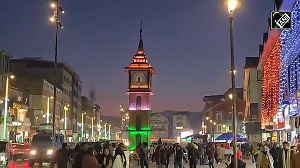When Jacky Godoffe floated the idea of setting a fixed route for competitive speed climbing to the sport's international governing body in 2004, it was laughed off as a joke.
Fast-forward 20 years, and the universal route that the trailblazing French climber conceived then will mark a moment in history at the Paris Games, becoming the stage for the first-ever Olympic medals to be handed out in speed-climbing.
"I remember I was in a meeting in Italy in 2004 and I said as a joke, why couldn't we make this speed route with unique holds? And they laughed at me," said Godoffe, who was route-setting for the international climbing federation at the time.
"A couple of months later they told me, okay, maybe give us a proposal and we'll see what you can get. One year later this idea became reality," he told Reuters.
Speed climbing - a vertical sprint up a 15-metre-high wall - debuted at the Tokyo 2020 Games, but it was controversially combined with two other disciplines - boulder and lead - as a compromise because the Olympics could only offer a single medal event for the new sport.
But in Paris, speed climbing will, to the relief of the competitors, be a stand-alone event and produce a gold medal each for the fastest woman and man.

Godoffe, 67, said the concept for the universal speed route was to provide "something like the 100-metre track", where the race would be decided in about 10 seconds. The first race was held in Munich, at the 2005 World Cup.
"So it started with a joke and 20 years later it's still here," he laughed. "But I was just a little piece of stone in the construction."
Godoffe described route-setting as "the science of uncertainty", and that he was far from being wedded to the current design, where the world record for men is now under 5 seconds and about 6 seconds for women.
"I didn't expect it to last this long," he said. "And honestly, two years (after the first race), I told the federation that this route maybe could change every two years, or every year, I don't know. But it's out of my hands now."













 © 2025
© 2025